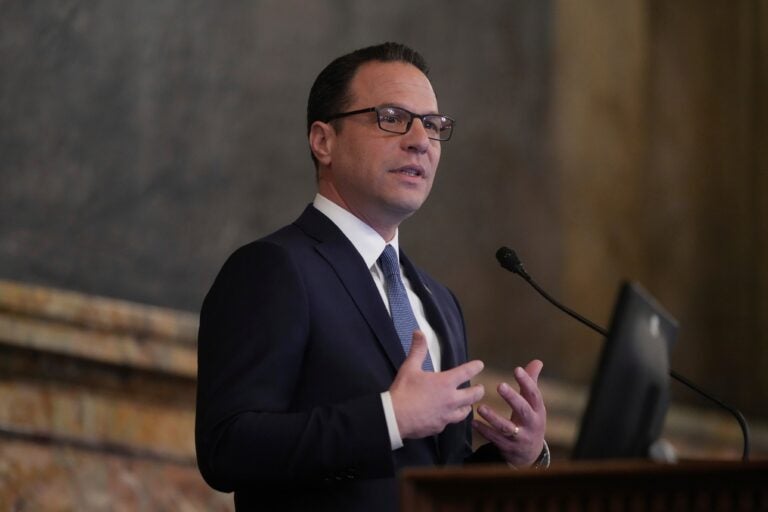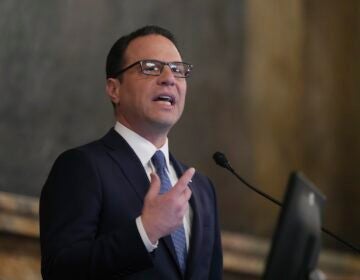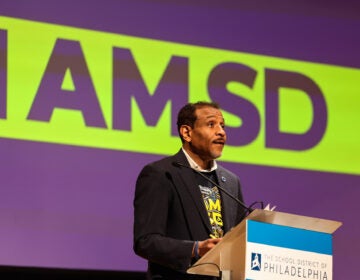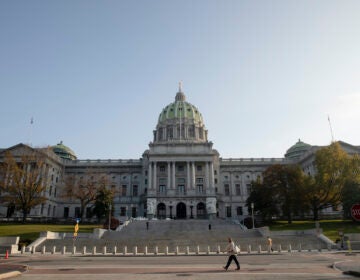Gov. Shapiro seeks to further increase education spending on underfunded schools
Last year, the state passed a budget with record education spending. Shapiro is asking for more money for education, including more than $500 million more for schools in need.
Listen 1:05
FILE - Pennsylvania Gov. Josh Shapiro delivers his budget address for the 2025-26 fiscal year to a joint session of the state House and Senate at the Capitol is seen, Tuesday, Feb. 4, 2025, in Harrisburg, Pa. (AP Photo/Matt Rourke)
From Philly and the Pa. suburbs to South Jersey and Delaware, what would you like WHYY News to cover? Let us know!
Pennsylvania Gov. Josh Shapiro put forth his budget proposal Tuesday, his third since taking the top role in the state. The budget reflects a state flush with cash, a result of a strong economy and large tax receipts.
The governor is, once again, looking to use the financial flexibility to further strengthen the state’s public education, building on record spending in the last budget.
“We invested $11 billion in public education for the first time and targeted those dollars to the schools that need them most,” he told the legislature in his annual speech. “We’re starting to meet the needs of our students, including serving nearly 92 million free breakfasts to school kids last year.”
The proposal includes $75 million in basic education funding and another $40 million for special education. An additional $526 million would go to the most underfunded schools in the state. The effort to raise the quality of the schools in low-income districts reflects a response to a 2023 court decision that the school funding system is “unconstitutional.” The current budget passed last summer and included more than $500 million for underperforming schools.
The governor is also proposing increasing the fund for school facility improvements by $25 million, up to $125 million. In addition, Shapiro’s proposal continues funding for student mental health and safety at $111 million. Another $3 million would be spent on making menstrual hygiene products available in schools.
The budget also asks for an additional $41.6 million in pre-K and $55 million for licensed child care centers for teacher recruitment and retention. Public higher education institutions in the commonwealth would receive more than $120 million in additional funding. Career and technical education would receive $5.5 million for restoring classroom-based vocational technology training.
Supplement teacher training and workforce development programs would also see increases. For teachers, that means a doubling of funding for student teacher stipends to $40 million. That program provides $10,000 stipends to aspiring educators while they perform their full-time student teaching experience. Recipients agree to teach at schools within Pennsylvania for at least three years.
The budget also seeks to expand other adult education and job training programs and to provide assistance for recruitment and hiring of child care and home health workers. For example, $55 million would provide bonuses for child care workers in an effort to reduce child care costs, while $15 million for increased wages for pre-K educators and another $21 million for direct workers who provide services to adults with physical disabilities. Another $6 million would be set aside for adult literacy centers and $5 million for the Office of Vocational Rehabilitation to assist people with disabilities in finding employment.
The Pennsylvania State Education Association applauded the governor’s education proposals. PSEA president Aaron Chapin said the governor “absolutely knocked this budget out of the park.”
“We commend Gov. Shapiro’s remarkably strong commitment to public education,” he said. “As a whole, this budget represents a major step forward in fully and fairly funding our public schools and addressing the educator shortage.”
He specifically highlighted the increased allocation for teacher stipends as a step toward “fully funding this important program.”
“In the current school year, more than 4,000 student teachers applied for stipends, but there was only enough funding for 2,144. We need at least $50 million to ensure that every eligible student can receive a stipend as they complete their student teaching,” Chapin said.
However, Republicans responded to the proposal saying that the governor’s budget overestimates projected revenues, including income streams that haven’t been created yet, such as from taxing sales of recreational marijuana, which is still illegal in Pennsylvania.
The state, they argue, can’t spend its way to quality education. House Republican leader Rep. Jesse Topper said that “transformational change” is necessary to improve the state’s education system regardless of how much money is spent on it.
“School choice has to be on the table,” he said. “There are some students that simply do not do well in a public school setting, no matter how great the school, and there are some schools that regardless of how much money they’re getting, they’re still in crisis and their communities are still in crisis.”
The budget is due before July 1, when the new fiscal year starts. Last year, it was two weeks late.

Get daily updates from WHYY News!
WHYY is your source for fact-based, in-depth journalism and information. As a nonprofit organization, we rely on financial support from readers like you. Please give today.








